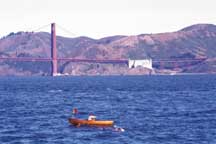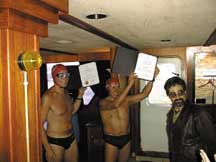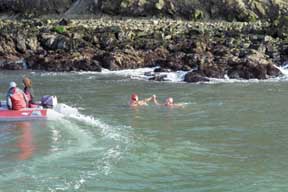I went to the library to look up the exact meaning of the word "centurion." A centurion was the commander of 100 soldiers in a Roman legion, and there were 60 centurions to a 6,000-man legion. The highest post for a centurion was primus pilus, the leader of the first cohort of the legion. A Roman soldier, coming from the ranks of the plebeians, the common people, had to be very special and work hard to earn the rank of centurion. His characteristics were toughness, reliability, stamina and courage.

Published: August, 2001
I went to the library to look up the exact meaning of the word "centurion." A centurion was the commander of 100 soldiers in a Roman legion, and there were 60 centurions to a 6,000-man legion. The highest post for a centurion was primus pilus, the leader of the first cohort of the legion. A Roman soldier, coming from the ranks of the plebeians, the common people, had to be very special and work hard to earn the rank of centurion. His characteristics were toughness, reliability, stamina and courage.
There is nothing commonplace about Gary Emich, or Pedro Ordenes. Members of the underground Sunrisers Swimmers, you can usually find them in the bay at six in the morning swimming eastward, or westward, depending on the tides and currents that day, towards home at the South-End Rowing Club. That is surprising when you consider that neither of them is a San Franciscan. Chile-born Ordenes lives and works in Marin County. Emich hails from Pacifica and works in San Carlos. Both however, are on a quest, willing to pay the price of an early unnecessary commute in order to do something no one else has done.
It is June 11, a very significant day in the annals of prisons in America. It is the day when agnostic Terry McVeigh may find out where, if anywhere, he is going next. It is also the 39th anniversary of the prison breakout that was the basis for the movie Escape From Alcatraz. It will be a big day for Ordenes and Emich.
In the predawn hours, Bob Roper is getting the club Zodiac ready for a run out onto the Bay. The sun has not quite made it over the Berkeley Hills, and there is a cold bite to the air, not unusual that time of morning on the South End Club pier. Behind him are two semi-naked men, one clutching a mug of coffee, the other joking with a small group of observers who have come to witness the culmination of years of preparation involving hundreds of hours of immersion in the chilly waters of the San Francisco Bay. They look nervous. This is the day when it all come together: Emich and Ordenes will ride out to Alcatraz Island, and together will slip, with a gasp, into the murky water, to each attempt his 100th swim from Alcatraz to the distant and welcoming shores of San Francisco.
If you are wondering what it might be like to swim from Alcatraz, I can tell you. When you first jump into the water it is cold; very cold. Your first sensation is one of shock. You are cold all over, all at once. If you are not accustomed to it ("Oh, yeah, here comes another bucket of ice water. Oh well."), your reaction might be panic. Once past the initial shock you merely have to put up with the cold until you get to shore, losing precious body heat every second. In a while, your fingers and toes will start to get numb, and shortly your hands and feet will feel like bricks. If you are in the water too long, hypothermia will visit; it can bring you to death’s door. (These two guys, by the way, are traditionalists. They wear nothing but skimpy bathing suits, goggles and swim caps.)
You need not worry about being alone. There are always boaters on the Bay, with sharp fast spinning propellers, some of them paying attention to what is in the water, some of them in a state of oblivion. If you need more to worry about, there are critters in the water with you; 800-pound sea lions, seals, jellyfish, and, yes, the occasional member of the Jaws family. (No member of the South End Club has ever been bitten by a shark, despite swimming in San Francisco Bay for over 135 years…yet.)
Then there is that old myth about it being impossible to swim from Alcatraz. That, of course, is background to what this quest is all about: Myth-Demolishing, Big Time.
It would be dishonest if I led you to believe that these were two ordinary guys. Both are accomplished triathletes, having completed the extremely difficult Escape From Alcatraz Triathlon, described as the "The World’s Most Dangerous Triathlon." For his special Millennium celebration, Ordenes swam across the Strait of Magellan, staying naked in 40-degree water for over two hours. Emich is one of the few Americans to have swum in high-altitude Lake Titicaca in the Peruvian Andes. Both are also people who give generously back to their sport and their club, Ordenes with his Thursday evening bay swimming classes, and Emich through the San Francisco Bay Swimming Association. Did I tell you that both of them are past 50?
A bunch of us, friends and family of Gary and Pedro, are gathered on the deck of the chartered California Spirit to witness this historic swim. We are standing about 20 yards off the southern tip of Alcatraz Island as master craftsman Bob Roper makes ready in the Zodiac. Pedro peers up at us. He has goose bumps all over and his nipples are hard from the cold. Gary looks up at us, seeing his Mom and Dad, who have come thousands of miles to be here for him.
There is a 4.1-knot ebb today, a fast westbound current, faster than any swimmer can challenge. (They plan to swim across the current, not against it.) When that wall of thousands of tons of moving water collides with the granite of Alcatraz Island it is split, half forced to run fast to the northwest on the east face of Alcatraz. The other half is scrunched around the southern end, boiling up in angry confusion before turning slightly north. It is into that rumbly-jumbly mess that they dive, headed south towards the inviting shores of San Francisco. On the island there is a battered old sign that reads, in essence, "Stay the hell off this island." It might just as well say, "Stay the hell out of this water."
The chop is so high and so close-packed that it is difficult for the swimmers to see even a few feet ahead, let alone stay together. Half a dozen of the most experienced paddlers in the Bay are out there in kayaks and rowboats to take part in this celebration, and their presence and experience will be of value to the swimmers. As boats and swimmers yo-yo up and down, they very slowly make headway, inching away from Alcatraz through the chaos. The first fifty yards takes an eternity. A 15-knot wind is coming in from the Gate, going in the opposite direction to the current. When the westbound current runs under an eastbound wind you can count on wave action following the wind. There are three to four foot rollers making their way to Emeryville. Just looking down at the two rolling, tossing bodies makes me feel a little seasick; imagine how they feel. The conspiracy of wind, current and waves is making it tough going for the swimmers.
The people on the California Spirit are chanting "GO, GO, GO," but I don’t think that the two corks bobbing in the water can hear them. Emich’s mother is at the rail, slightly green. Divorced since 1974, this is the first time she has seen her ex, who is also a little green, in over a quarter of a century. A contingent of Chileans is there to cheer for Pedro. Members of the 137-year-old South End Club are on board, many of whom have swum from Alcatraz; they are aware that the conditions today are making it pretty tough for the swimmers.
At length they are out of the immediate environs of Alcatraz, away from the nasty chop, but not the wind, waves and current. Straight ahead, a mile and a half to the south, is Aquatic Park and the Muni Pier at the foot of Van Ness, but this current will never allow them to get there. Swimming south, being pushed west by the river of water, they are now opposite the three bright piers of Fort Mason. San Francisco Bay’s version of a vindictive Neptune won’t allow there, either; he seems to have a feeling of being disrespected by this trampling of his authority, his ferocious dignity. 100 swims, indeed!
They swim together, Gary and Pedro, stroke for stroke. When Pedro stops to clear his goggles, Gary treads water. They have a pact: neither one will be the first to finish; they will finish together or not at all.
They are getting closer, maybe 500 yards from the shore. Lifting his head Gary can now see morning joggers on the Marina Green. "Screw you," says Neptune, "Keep moving west. You will get out of the water when I let you." The Marina Green is now out of reach, and the Saint Francis Yacht Club is coming up and the dome of the Exploratorium. "Not yet, " says the King of the Sea as he kicks them even further west.
The Golden Gate Bridge is getting too close for comfort, not more than a half mile away; the next stop is Hawaii. There is a back eddy along Crissy Field, and it is there that they get a break. Emich and Ordenes evaluate the situation, exchange words and put on a strong finishing kick, going like hell the last fifty yards over the backs of waves, body surfing onto the hard packed sand. As they stand together on the beach, arms raised together in shared victory, there is a roar of relief and happiness from the crowd on the California Spirit. Patrick Peyton breaks out a bottle of bubbly. A group of Sunrisers on the boat sends an irreverent salute to the victors, dropping their trousers, mooning the beach.
A balloon-carrying crowd has appeared out of nowhere on the beach, helping the two cold, clammy bodies to heated automobiles and hot coffee. It is over.
An hour later we are all eating frittatas at Franchessi’s. Someone starts a round of "We Are the Champions." Then we all go home or to work, thinking about what we might do tomorrow. 200? Nah, that’s a no-end route. It has to be something original. San Francisco to Hawaii? Hmmm…
Pedro Ordenes and Gary Emich have surpassed the combined potential of a thousand average Americans and have accomplished what most people cannot even dream of doing. In fulfilling their quest "to swim the impossible swim," not just once, but a hundred times, they have made an indelible mark. Throughout their long and arduous campaign they have shown all the virtues that distinguish a centurion from an ordinary soldier: toughness, reliability, stamina and courage.
Congratulations to Gary and Pedro, Myth-Demolishers, you have earned the right to be known as primi pili, true leaders, the first and best among centurions.

Our intrepid swimmers receive official City of San Francisco recognition from Supervisor Aaron Peskin, himself a Bay swimmer.

Reaching shore.

